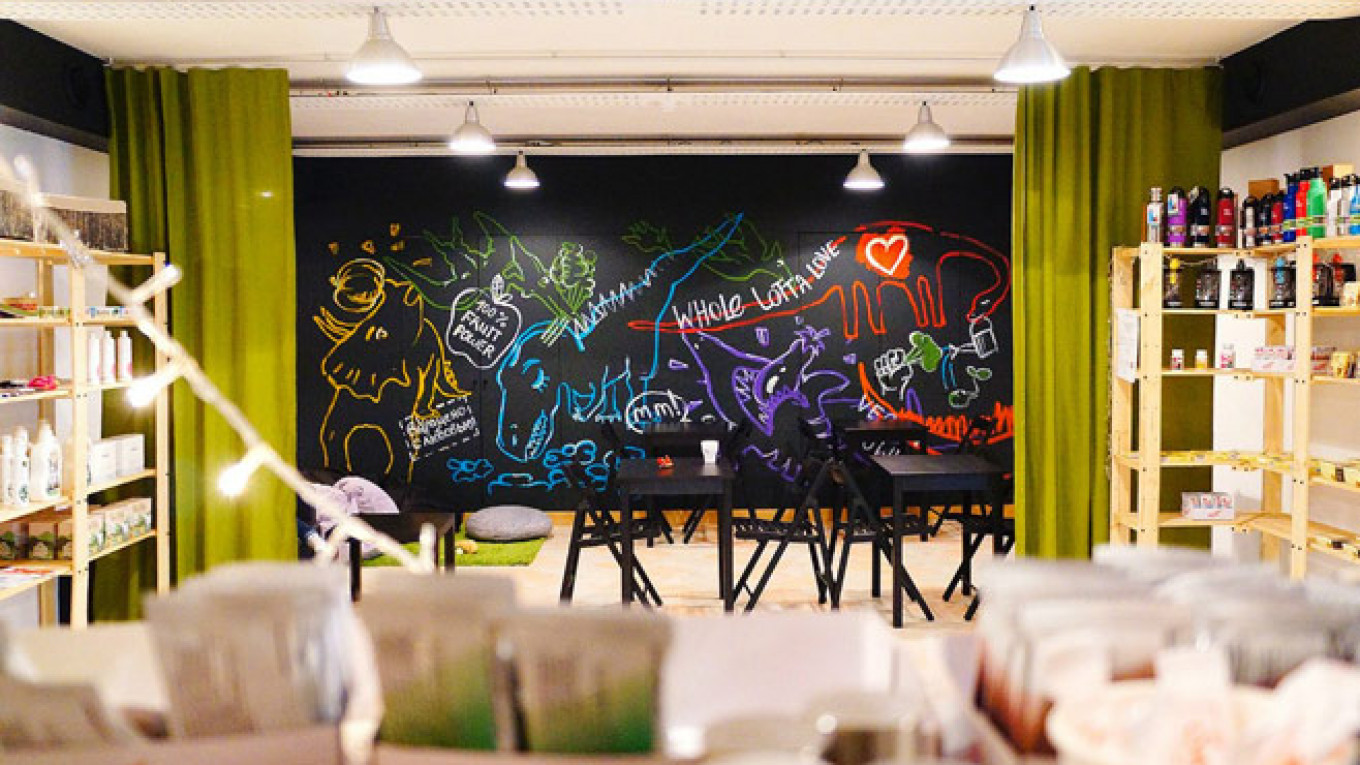The Russian capital is undergoing a vegan diet boom. In the past month, pan-Asian restaurant Shanti has opened a vegan branch called Shanti-Green, a new vegan market with prepared foods has opened in Patriarch's Ponds and the Botanika restaurant near Belorusskaya has launched a raw food menu. This is in addition to the expansion of Canadian vegan restaurant chain Fresh to three stores last year up from its original Moscow restaurant, which opened in 2012.
"People are tired of smoking and drinking, it's not cool anymore," Yekaterina Petrenko, manager of the vegan, vegetarian and raw food cafe Sok ("Juice") said. The cafe opened in 2011, and Petrenko said that since that time, the cafe has seen its traffic increase by 60 percent. Today it's not uncommon to see a line of people waiting for a table. "Our biggest hit is a raw tart made of carob," Petrenko said.
Perhaps its not surprising that Sok, which has a prime location in front of the Tretyakov Gallery, attracts a constant stream of both tourists and locals. But the real sign that veganism is taking hold is the opening of vegan cafes even on the outskirts of the Russian capital.
The Happy Vegan Shop, whose original store is located just off the popular pedestrian Arbat street, made the decision to open a branch in Mitino — a traditional, working-class bedroom community outside the Moscow Ring Road — last December.
"The client database for our online shop showed us that surprisingly a lot of people ordered vegan food from Mitino, so we decided to set up in this location," Lyudmila Dariyenko, the owner of the Happy Vegan Shop said. "First I was afraid that locals would be resentful, ask where is the meat? But in reality non-vegetarian locals love it," Dariyenko said, noting that profits have increased 20 percent since the start of this year.
The clientele in the Mitino location is different from the customers of Happy Vegan Shop near the Arbat, which tends toward hipsters and tourists. In Mitino, the shop is popular with pregnant women, mothers and grandmothers who want to feed the children in their care organic food.
The shop, which also has a cafe offering coffee with soy milk, falafel, lentil burgers, rice and salads, makes more money from grocery sales. Currently, Happy Vegan Shop sells an average of 100 kg of tofu a month — up from 70 kg per month in 2013. Another popular offering is a locally produced line of eco-friendly household cleaning products.
Nothing sold in the shop is made from or has been tested on animals.
"Our main idea is to attract as many people as possible to a lifestyle that refuses to take part in the killing and exploitation of animals," said Dariyenko, 30, who has been a vegan for five years and considers herself more of an activist than a businessperson.
Dariyenko is not the only vegan cafe owner who puts her beliefs ahead of her business.
Svetlana Zemtsova, the director of the online market Siroy Obed ("Raw Dinner") and raw food cafe Skatert Samobrank ("Magic Tablecloth") calls her prices — which average 100 rubles ($2) per dish — "laughable." Zemtsova says that she is able to keep her prices low because she buys vegetables from farmers in the Tver region who also want to support "the good work" of selling organic vegetables.
Zemtsova thinks that the growth of the ecological and healthy living movement in Russia started about four years ago, and the Internet has played a major role in spreading information about healthy living. "People began to realize that it's better to invest in your health than in medicine," she said, noting that her company's annual Healthy Way of Life festival — which takes place in April and features a market with eco-friendly products and master classes — attracted 1,000 people in 2014, up from 500 the year before.
Anton Lubni says he opened the Fruits and Veggies vegan cafe in the popular Artplay design and exhibition district to evangelize about veganism and recycling. He keeps costs in his cafe down by growing some of the produce used in his recipes.
"There are 20 tomato plants, peppers, cucumbers, basil and mint in our greenhouse on the roof. We also grow strawberries on our terrace," Lubni said, noting that the greenhouse does not yet supply all the vegetables needed for the cafe and he sometimes has to resort to buying them from supermarkets.
Andrei, 27, a frequent visitor to the Happy Vegan Shop in Mitino, says the vegan food trend in Russia will only continue to expand, partially because of the popularity of India as a destination for Russians. "Russians travel a lot to India, where the vegetarian and vegan diet and yoga are part of culture," Andrei said, adding that he had been a vegan for eight years.
Contact the author at [email protected]
A Message from The Moscow Times:
Dear readers,
We are facing unprecedented challenges. Russia's Prosecutor General's Office has designated The Moscow Times as an "undesirable" organization, criminalizing our work and putting our staff at risk of prosecution. This follows our earlier unjust labeling as a "foreign agent."
These actions are direct attempts to silence independent journalism in Russia. The authorities claim our work "discredits the decisions of the Russian leadership." We see things differently: we strive to provide accurate, unbiased reporting on Russia.
We, the journalists of The Moscow Times, refuse to be silenced. But to continue our work, we need your help.
Your support, no matter how small, makes a world of difference. If you can, please support us monthly starting from just $2. It's quick to set up, and every contribution makes a significant impact.
By supporting The Moscow Times, you're defending open, independent journalism in the face of repression. Thank you for standing with us.
Remind me later.






